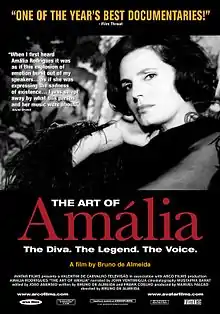| The Art of Amália | |
|---|---|
 | |
| Directed by | Bruno de Almeida |
| Starring | Amália Rodrigues |
| Cinematography | Mustapha Barrat |
| Edited by | João Asensio |
Release date | 2000 |
Running time | 90 minutes |
| Countries | Portugal, United States |
| Language | English |
The Art of Amália is a documentary by Bruno de Almeida on the artistic career of Amália Rodrigues (1920–1999), the celebrated Fado singer from Portugal. The 90-minute film is based on a previous five-hour made-for-television mini-series on the singer that dealt with her life and career; it was also de Almeida’s fourth cinematic project celebrating Rodrigues’ career.[1]
The film opens with an on-screen introduction by David Byrne, who praises the singer for “singing in these fado songs about the sadness of the universe, not only about a personal sadness or a tragedy in her own life or in the writer's life, but she was expressing the sadness of existence."[2] The Art of Amália mixes rare film, television and concert footage from different periods of Rodrigues’ career. The film also presents a previously thought lost clip of a rare appearance (billed only as “Amália”) on U.S. television in 1953, where she performed her hit song "Coimbra" (better known to U.S. audiences in the English-language version "April in Portugal").[1]
The Art of Amália also includes the last filmed interview by Rodrigues, who died one week before production was completed.
The film had its U.S. premiere in March 2000 at a United Nations benefit, and its theatrical premiere in New York in December 2000. A DVD was released 2004.[3]
References
- 1 2 "Film Threat interview with Bruno de Almeida". Filmthreat.com. 2000-05-15. Retrieved 2017-02-25.
- ↑ Nitrate Online review of the film
- ↑ "Amália Rodrigues – The Art Of Amália". discogs.com. Retrieved 2019-05-23.
External links
- The Art of Amália at IMDb
- http://www.arcofilms.com/ - production company
- https://www.nytimes.com/2000/12/03/movies/film-the-queen-of-fado-portugal-s-soul-lives-again.html - New York Times article by Jon Pareles